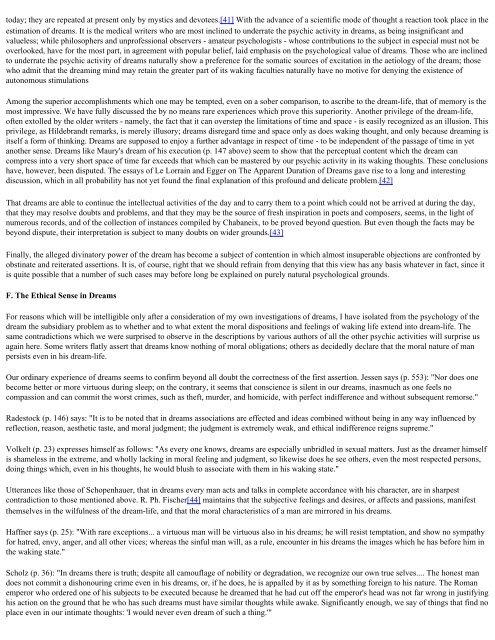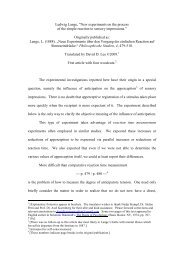The Interpretation Of Dreams Sigmund Freud (1900) PREFACE
The Interpretation Of Dreams Sigmund Freud (1900) PREFACE
The Interpretation Of Dreams Sigmund Freud (1900) PREFACE
Create successful ePaper yourself
Turn your PDF publications into a flip-book with our unique Google optimized e-Paper software.
today; they are repeated at present only by mystics and devotees.[41] With the advance of a scientific mode of thought a reaction took place in the<br />
estimation of dreams. It is the medical writers who are most inclined to underrate the psychic activity in dreams, as being insignificant and<br />
valueless; while philosophers and unprofessional observers - amateur psychologists - whose contributions to the subject in especial must not be<br />
overlooked, have for the most part, in agreement with popular belief, laid emphasis on the psychological value of dreams. Those who are inclined<br />
to underrate the psychic activity of dreams naturally show a preference for the somatic sources of excitation in the aetiology of the dream; those<br />
who admit that the dreaming mind may retain the greater part of its waking faculties naturally have no motive for denying the existence of<br />
autonomous stimulations<br />
Among the superior accomplishments which one may be tempted, even on a sober comparison, to ascribe to the dream-life, that of memory is the<br />
most impressive. We have fully discussed the by no means rare experiences which prove this superiority. Another privilege of the dream-life,<br />
often extolled by the older writers - namely, the fact that it can overstep the limitations of time and space - is easily recognized as an illusion. This<br />
privilege, as Hildebrandt remarks, is merely illusory; dreams disregard time and space only as does waking thought, and only because dreaming is<br />
itself a form of thinking. <strong>Dreams</strong> are supposed to enjoy a further advantage in respect of time - to be independent of the passage of time in yet<br />
another sense. <strong>Dreams</strong> like Maury's dream of his execution (p. 147 above) seem to show that the perceptual content which the dream can<br />
compress into a very short space of time far exceeds that which can be mastered by our psychic activity in its waking thoughts. <strong>The</strong>se conclusions<br />
have, however, been disputed. <strong>The</strong> essays of Le Lorrain and Egger on <strong>The</strong> Apparent Duration of <strong>Dreams</strong> gave rise to a long and interesting<br />
discussion, which in all probability has not yet found the final explanation of this profound and delicate problem.[42]<br />
That dreams are able to continue the intellectual activities of the day and to carry them to a point which could not be arrived at during the day,<br />
that they may resolve doubts and problems, and that they may be the source of fresh inspiration in poets and composers, seems, in the light of<br />
numerous records, and of the collection of instances compiled by Chabaneix, to be proved beyond question. But even though the facts may be<br />
beyond dispute, their interpretation is subject to many doubts on wider grounds.[43]<br />
Finally, the alleged divinatory power of the dream has become a subject of contention in which almost insuperable objections are confronted by<br />
obstinate and reiterated assertions. It is, of course, right that we should refrain from denying that this view has any basis whatever in fact, since it<br />
is quite possible that a number of such cases may before long be explained on purely natural psychological grounds.<br />
F. <strong>The</strong> Ethical Sense in <strong>Dreams</strong><br />
For reasons which will be intelligible only after a consideration of my own investigations of dreams, I have isolated from the psychology of the<br />
dream the subsidiary problem as to whether and to what extent the moral dispositions and feelings of waking life extend into dream-life. <strong>The</strong><br />
same contradictions which we were surprised to observe in the descriptions by various authors of all the other psychic activities will surprise us<br />
again here. Some writers flatly assert that dreams know nothing of moral obligations; others as decidedly declare that the moral nature of man<br />
persists even in his dream-life.<br />
Our ordinary experience of dreams seems to confirm beyond all doubt the correctness of the first assertion. Jessen says (p. 553): "Nor does one<br />
become better or more virtuous during sleep; on the contrary, it seems that conscience is silent in our dreams, inasmuch as one feels no<br />
compassion and can commit the worst crimes, such as theft, murder, and homicide, with perfect indifference and without subsequent remorse."<br />
Radestock (p. 146) says: "It is to be noted that in dreams associations are effected and ideas combined without being in any way influenced by<br />
reflection, reason, aesthetic taste, and moral judgment; the judgment is extremely weak, and ethical indifference reigns supreme."<br />
Volkelt (p. 23) expresses himself as follows: "As every one knows, dreams are especially unbridled in sexual matters. Just as the dreamer himself<br />
is shameless in the extreme, and wholly lacking in moral feeling and judgment, so likewise does he see others, even the most respected persons,<br />
doing things which, even in his thoughts, he would blush to associate with them in his waking state."<br />
Utterances like those of Schopenhauer, that in dreams every man acts and talks in complete accordance with his character, are in sharpest<br />
contradiction to those mentioned above. R. Ph. Fischer[44] maintains that the subjective feelings and desires, or affects and passions, manifest<br />
themselves in the wilfulness of the dream-life, and that the moral characteristics of a man are mirrored in his dreams.<br />
Haffner says (p. 25): "With rare exceptions... a virtuous man will be virtuous also in his dreams; he will resist temptation, and show no sympathy<br />
for hatred, envy, anger, and all other vices; whereas the sinful man will, as a rule, encounter in his dreams the images which he has before him in<br />
the waking state."<br />
Scholz (p. 36): "In dreams there is truth; despite all camouflage of nobility or degradation, we recognize our own true selves.... <strong>The</strong> honest man<br />
does not commit a dishonouring crime even in his dreams, or, if he does, he is appalled by it as by something foreign to his nature. <strong>The</strong> Roman<br />
emperor who ordered one of his subjects to be executed because he dreamed that he had cut off the emperor's head was not far wrong in justifying<br />
his action on the ground that he who has such dreams must have similar thoughts while awake. Significantly enough, we say of things that find no<br />
place even in our intimate thoughts: 'I would never even dream of such a thing.'"



